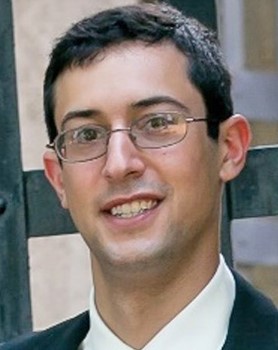
Dr. Cassuto Reflects on Opportunities and Experiences He Gained Through Entering the M.D./Ph.D. Program
James R. Cassuto, M.D./Ph.D. ’15, Traveled Around Europe as a Research Fellow and Learned his Passion for Radiology

What made you choose New York Medical College?
I was drawn to NYMC for several reasons: Most important was the varied and unique training opportunities that could not be found elsewhere. Being exposed to as many different fields and practice types as possible is exceptionally important. It allows you to get a feel for the type of practice setting you may want to work in, an appreciation for the myriad of specialties that exist, and ultimately, to become a well-rounded physician. At NYMC, medical students get exposure to the highest-level trauma and surgical care, Fifth Avenue concierge practices, the Veteran’s Administration, rural medicine, community hospitals, urban clinics and large public hospitals.
Lastly, I was drawn to NYMC because of the opportunity to enter the M.D./Ph.D. program after being accepted to the M.D. Program. As an undergraduate student, I was uncertain if pursuing a Ph.D. was something I would like doing. Being able to "test the waters" during the first and second years of medical school prior to committing to seven years of graduate school was a big deal for me.
What is your fondest memory of New York Medical College?
My Ph.D. research at NYMC studied the effects of diabetes on the function of the smallest arteries in the heart. To do this, I spent 3.5 months learning how to dissect blood vessels that were no wider than two hair widths in diameter. Because of this new skill, I was invited to Oxford University as a research fellow (or hired gun) to assist their micro vessel dissections. While at Oxford, I met two Nobel laureates and got to see the world-famous sea urchins that always wind up in the prestigious journal, Nature. I also got to travel all over Europe on the weekends, see how medicine is practiced in other countries, and enjoy the study abroad which I never got to do as an undergraduate student.
What is your current professional role/position and what are some highlights of your career track?
I am currently a second-year dual radiology and nuclear radiology resident at Jackson Memorial Hospital in Miami, Florida. As the third largest hospital in the country, the "gateway to American medicine" for most of South America, and the training center for many military medics, Jackson has allowed me to see pathology cases I would never see anywhere else. A highlight for me as a resident is being able to share these amazing cases with students who come from all over the world to train here.
Nuclear radiology/nuclear medicine is a field which has started to shift from being mostly diagnostic to now encompassing therapeutic modalities. As someone interested in bridging the amazing discoveries in basic research in radiology/nuclear medicine to patient care, I am excited to be entering the field of nuclear radiology during this period of transition. In particular, I see incredible potential in being able to use radiopharmaceuticals to target specific tumor markers—essentially customized radiation therapy designed for each patient's specific tumor type.
Based on your experiences, what advice would you give to future students and future alumni of New York Medical College?
Aside from doing what makes you happy, always keep an open mind about choosing a specialty. It took an anesthesiologist at the University of Pennsylvania Hospital during my cardiac surgery sub-internship to tell me, less than five months before applications opened for residency, that it seemed I liked the pre-surgical imaging/planning more than doing the surgery itself. Until that moment, I hadn't thought of becoming a radiologist. I rescheduled my radiology course so I would complete it prior to submitting my residency application and was sold on the specialty from that moment on.
When you’re not working, where are you most likely to be found and what are you most likely to be doing?
When not working, I am cycling, swimming, playing handball (there are ocean-side courts in Miami!), learning to kiteboard with my wife, and playing the saxophone. Also, I mentor technology start-ups to help them develop their research plans and obtain small business grants and venture capital funding.

